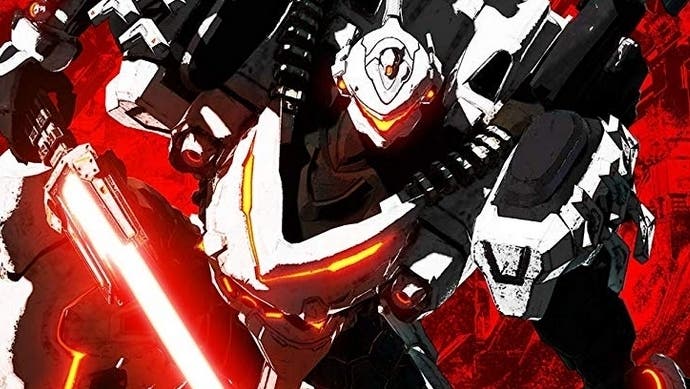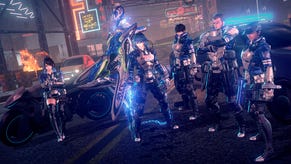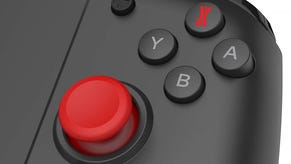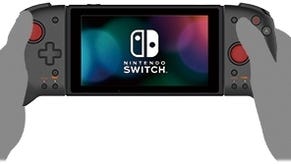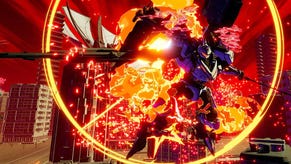Daemon X Machina review - a clanking Armored Core successor with moments of magic
Mech do.
It really has been far, far too long since the last truly decent mech game, and the Nintendo Switch's Daemon X Machina comes so very close to being exactly what we've been waiting for all these years.
That's down, in part, to its heritage, and its leanings; this is at heart a spiritual successor to FromSoft's beloved Armored Core series that's been missing in action for so long, with series producer Kenichiro Tsukuda onboard. Indeed, it comes so close to that formula that it feels like a direct follow-up to 2008's Armored Core: For Answer, injected with some lysergic colour to help give it an identity of its own.
That formula, should you need reminding - and it's fair enough if you do, given its absence across the past decade - is simple. Customise a robot as you daub it in decals and choose from myriad parts, juggling stats and the resources required to run certain pieces of armour and mods until you've got a build that's just to your liking. Then go forth and be badass in your big bastard mech.
If you've any love for piloting 50-foot robots then there's so much to smile about in Daemon X Machina (and if you haven't, then I'm really not sure what to say). In action, this thing can soar, as you mix and match aerial and ground assaults, boosting your way around targets that are in your soft-lock sights and clearing out wave after wave of cannon fodder before clashing laser swords with rival robots in skirmishes that trace across the skies.
The things that matter most for mech lovers are all present and correct, not least of which are the mechs themselves. Macross creator Shōji Kawamori has lent a hand, and you can feel that in the sturdiness of the mech designs available (it's also worth noting that Yūsuke Kozaki, responsible for the assured character artwork of Fire Emblem Awakening amongst others, is onboard, though the anonymous designs of the mech pilots found here are far from his greatest work).
Special credit, though, must go to developer Marvelous for how it's brought these mechs to life. The movement feels wonderful, a sense of weight and momentum told in the swaying hips of your mech as they glide around a salted earth with the grace of an Olympian ice skater. In the skies they're handy too, if not quite so graceful, and battles are told through bright blooms of cel-shaded explosions that look like they've been lifted from a Macross cel. Put some thundering metal music behind it all and there are moments when I just wanted to stand and salute what's been achieved here.
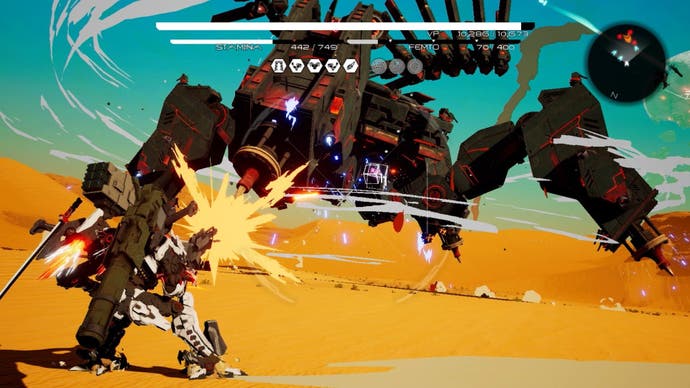
Missions are plentiful and varied, up to the point where they're not. Having been impressed by the scope of early mission types, from plain old escort missions to tearing down buildings to more focussed linear runs through grandiose networks of tunnels, there's soon repetition in what you're charged with. Still, there's room for improvement, and the potential for more further down the line with the promise of a PvP mode that's being added post-launch, while the four-player co-op that's there on day one can work a treat. Partner up with a few friends and take on one of the colossal mechs that serve as Daemon X Machina's boss fights and you're tantalisingly close to a tooled-up, jet-boosted Monster Hunter.
There are also moments where that action can fall on its face. The faithfulness to Armored Core is sometimes taken a mite too seriously, with performance that falters when things get busy - and they often do - and an unvarnished, back-of-the-movie-lot feel to so many of the assets. It looks like a PSP game that's got ideas above its station, and I don't necessarily mean that as a slur - just that, when coming into Daemon X Machina, it's probably best you temper your expectations.
Those production values come plummeting down when it comes to Daemon X Machina's story and lore, told in near-static cutscenes that then shift to entirely motionless boxes of text full of dreary exposition and even drearier characters. Get stuck in one of their conversations and it's like being trapped in an interminable WhatsApp group for a bunch of earnest teens who've just swallowed some ripe old anime. That's what the skip button's there for, though, and I have sat through many of the cutscenes so you don't have to - just know that, by hitting the start button every time the narrative begins to unfurl, you really aren't missing out on anything.
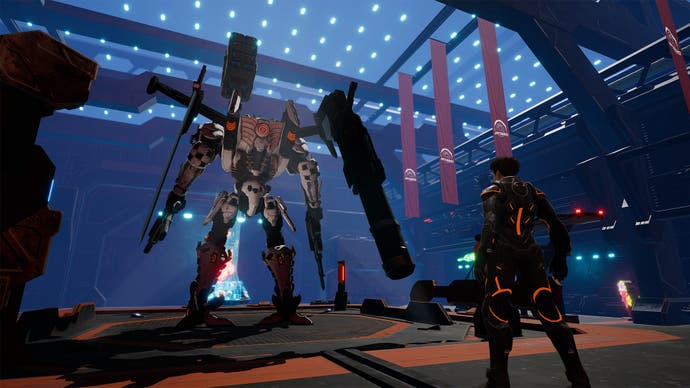
Outside of the action there's still plenty to distract you. In the small workshop that acts as your hub you're able to leaf through pages and pages of stats for each individual mech piece, speccing out your robot with a plethora of weapons and parts. There's variety in what's available - from laser swords and shields to laser rifles and homing missiles - which means flexibility in your builds, though they never feel quite as distinctive as those possible in vintage Armored Core. They're also fussy to put together with a menu system that's arcane to the extreme, perhaps another area where Daemon X Machina is a touch too faithful to the Armored Core formula, and with the payoff of your tinkering never being quite so pronounced it's something of a problem.
It makes for a frequently frustrating experience, an imperfect revival of a subgenre that already had enough imperfections of its own. Perhaps what really matters, though, is that Daemon X Machina knows what made those old games click, and dwells on the details that made Armored Core sing.
When you're dancing through abandoned cities with skyscrapers that come crumbling down under the weight of all that excessive firepower, all while you pirouette in between them and unleash your arsenal of shoulder-mounted rockets and clips of bullets from your oversized assault rifle into a swarm of robotic rascals, all that we've missed in Armored Core's absence comes into sharp focus. There are a lot of moving parts here, in short, and they're not exactly well-oiled. Daemon X Machina clanks along like a rusty old robot, and I think that's part of its charm.
